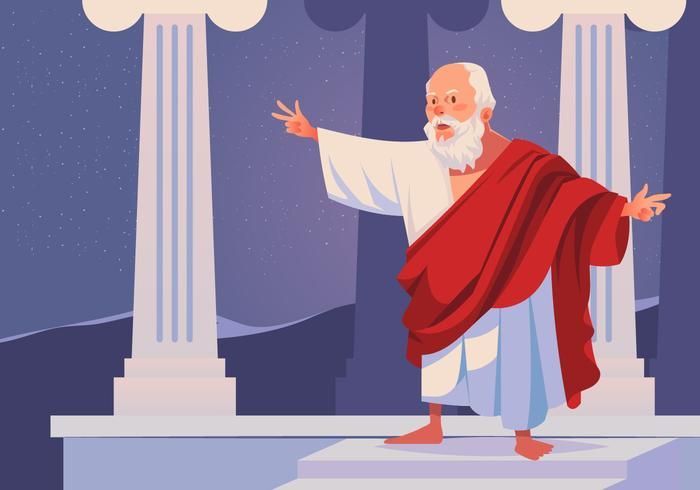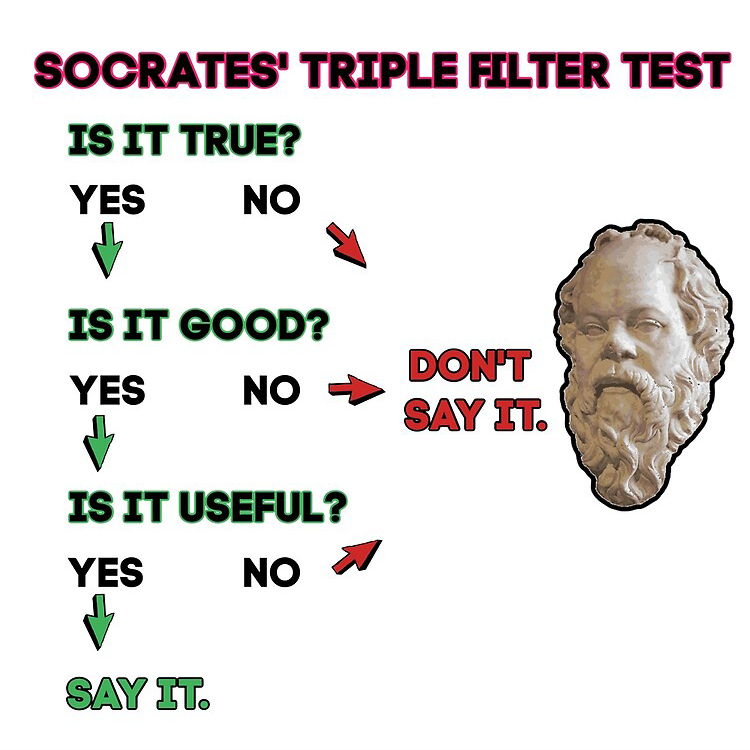3 HARD Questions: The TRIPLE-FILTER Test

A COUPLE THOUSAND years ago in ancient Greece, the great philosopher Socrates was strolling contemplatively around a town square when a neighbor walked up to him and said, "You're never in a million years going to believe what I just heard about our mutual friend—"
"Wait," Socrates interrupted, putting his hand up in the air. "Before you continue with this story, your words must pass the triple-filter test."
"The what?"
"The triple-filter test," Socrates said.
The neighbor just stared at him with a blank expression.
Socrates continued, "The first filter is Truth. Are you absolutely sure the story you are about to tell me is true?"
"Well, no," the neighbor said, "I literally just heard it from someone else I know."
"Aha . . ." Socrates quickly replied. "Then let's move on to the second filter. Is what you are about to share Good in any way, shape, or form?"
"No . . . no," the neighbor said, "this story is actually quite—"
Before he could finish his sentence, Socrates interrupted him again. "Ahh . . . so it may not be true and it is definitely not good."
"That's right," the neighbor assured him.
"Well, you may still be able to save yourself," Socrates said. "Is anything about the story you want to share Useful?"
The neighbor stared blankly again for a moment and then said, "No, I suppose it's not really—"
"So, you want to tell me something that may not be true, is definitely not good, and is not useful to know?" Socrates asked. The neighbor looked down at the ground and nodded. "Well, you have no good reason to tell me this story, and you have no good reason to believe it yourself," Socrates added as the neighbor dolefully walked away.

In many ways, not too much has changed since ancient Greece, especially when it comes to the stories we tell ourselves and each other. Every single day, we invest valuable time and energy in drama and hearsay. Many of us plug into social media first thing in the morning for reasons that have zero to do with what is true for us, good for us, and useful for those around us. Instead, we do it mostly just to distract ourselves . . . from ourselves.
In an expansive universe in which there are abundant opportunities to discover what's true, what's good, and what's useful, when we do the opposite, we know it. And while making that compromise—with lots of mind-numbing distractions—is tolerable for a little while, eventually it isn't anymore. Our negligence catches up to us, and we begin to feel pain.
Then, on really hard days, when the drama and hearsay just aren't enough to distract us from the pain that's been gradually building up in our minds, we begin to feel utterly broken inside.
Don't fall into the trap of breaking yourself down like that for no reason. Instead, take Socrates's advice: simply focus on what is true, good, and useful. It worked well for Socrates a couple thousand years ago, and we assure you it continues to work well for many people today.
The Power of the Triple-Filter Test

In today's world, where information bombards us from all directions, it's crucial to develop a filter that helps us navigate through the noise. The triple-filter test, as introduced by Socrates, provides a valuable framework for discerning the stories we consume and share.
The first filter, Truth, invites us to question the authenticity and accuracy of the information presented to us. In an age of misinformation and fake news, it's essential to question the source and veracity of what we hear or read. Before accepting and passing on information, let's take a moment to fact-check, cross-reference, and verify its truthfulness. By prioritizing truth, we can avoid spreading rumors or falsehoods that may harm others or ourselves.
The second filter, Good, we must assess the impact of the information on ourselves and others. Is it beneficial? Does it promote kindness, empathy, and understanding? If the story or gossip only serves to bring harm, sow discord, or create negativity, then it fails this filter. Our words and actions have consequences, and choosing to share or engage in stories that uplift, inspire, and encourage growth is a powerful way to create a positive ripple effect in the world.
The third filter, Usefulness, encourages us to consider the practicality and relevance of the information. Will it contribute to our personal growth, knowledge, or well-being? Is it something that can be applied to improve our lives or the lives of others? Discerning usefulness helps us prioritize our attention and energy on what truly matters, avoiding unnecessary distractions and focusing on meaningful pursuits.
Now, let's reflect on our daily habits. How often do we find ourselves caught in the web of drama, hearsay, and mindless scrolling? How frequently do we engage in conversations or share information without considering its truth, goodness, or usefulness? It's time to break free from this cycle.
When we make a conscious effort to apply the triple-filter test, we empower ourselves to be purveyors of truth, promoters of goodness, and catalysts of usefulness. We become more discerning consumers of information, ensuring that what we absorb aligns with our values and contributes positively to our lives.
It's not an easy task, especially when we're bombarded with sensationalized headlines, clickbait, and social media algorithms designed to capture our attention. But it's a choice we can make each day, reminding ourselves of the wisdom Socrates imparted centuries ago.
By embracing the triple-filter test, we cultivate a mindset of mindful consumption and responsible sharing. We become active participants in shaping the narratives we encounter, nurturing a culture that values authenticity, positivity, and practicality.
So, the next time someone approaches us with a juicy piece of gossip or a questionable story, let's remember Socrates and his wisdom. Let's pause, reflect, and apply the triple-filter test. And as we practice this habit, we'll not only transform our own lives but also inspire those around us to adopt a more conscious and intentional approach to the stories they tell and the information they consume.
In a world filled with noise and distractions, let's choose to be the voices that amplify truth, goodness, and usefulness. By doing so, we contribute to a collective shift toward a more informed, compassionate, and empowered society. The power lies within us to make a difference—one filtered story at a time.